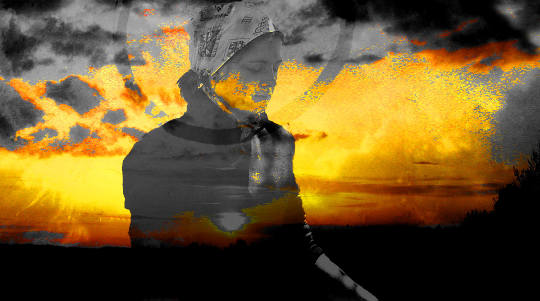
When I first had the experience of automatic writing, the only thing I knew of mystical experiences had to do with what I had learned about them in church: Jesus walked on water, Paul had one that transformed him, and the prophets had them. From listening to my religious teachers, I ingrained the idea that only special, chosen people were qualified enough to have mystical experiences.
Frankly, my own experience quite baffled me, mainly because I did not consider myself worthy enough to participate in this type of gift from God. Yet, there I sat, tears flowing, immersed in profound love quite beyond anything I ever experienced on Earth with the results right there on the paper I held in my shaking hands.
Tangible Evidence For An Intangible Experience
My question about my feelings of unworthiness had been answered in the most profound way, quite beyond anything I ever thought might happen. I had a hard time believing that God, angels, or Divine Spirit actually cared enough about me to actually give me an answer to my most troublesome question, “Why do I never feel good enough?” I had tangible evidence for an intangible experience right in front of me in the spiritual message I called “Castles.”
Carry not with you inappropriate ideas ingrained about your self-worth. The journey you’ve traveled has been filled with castles of silver and gold, shimmering with all their opulence, outshining each other, each one stating its worthiness by out-glimmering and overwhelming all...
Beloved one, have you ever seen the details of these castles, found their true substance? I am here to tell you an ordinary wind could smash these castles into unworthy debris. Their power derives from your weakness. It is not how much you glitter and shine in life that is important. Still the old voices. Listen to your authentic truth. Our Creator has made you complete; you have not been born without. Your eyes have only been blinded by what you perceive as a better castle.
You are your own castle, and it houses your soul. Blossom with your time on this earth, for an orchid will not bloom in an area that is pressed by judgmental stones. Leave the stones where they fall and breathe your journey with trust and patience. Your own castle shines.
Opening up to this further, I continued to receive these special messages. Although receiving each spiritual message was profound in different ways, I wondered if each experience could have been different forms of mystical experience. Could an intense experience with what my former childhood religious teachers called being “touched by the Holy Spirit” actually be another version of a mystical experience? Frankly, I had no idea. Yet, the experiences kept happening, fostering some profound changes in my life.
Everyone Is A Mystic Who Has Forgotten They're A Mystic
I’m now convinced every person on this earth is a mystic. I’m also convinced almost every person on this earth has forgotten all about this. Instead of being about doing and accomplishing, a mystical experience is more about remembering and understanding. The mystical experience profoundly propels you to not only transform ingrained beliefs about limitations, but also remember intrinsic wholeness through Divine intervention in a most profound way. Therefore, a mystic is a person who has experienced a direct connection with the presence of God that exceeds ordinary description and who is therefore deeply transformed.
I wish I could list in detail the formula, parts, and patterns of a mystical experience completely and with absolute authority. Yet, to have this in hand would be quite impossible. Mysticism just cannot be placed on a two-dimensional page.
Characteristics and Components of Mystical Experiences
Yet what I can do is describe some forms of mysticism, some events that happen to Mystics, and some components of the experience. These are not all-inclusive by any means. They are not all agreed upon by the researchers I found, either. They seem profoundly simple. And most of all, they are quite difficult to explain through language.
A mystical experience is ineffable. Words are always inadequate to describe in depth what happens during a mystical experience. The mystic is often whirled into a consciousness of cosmic proportions that just does not lend itself to ordinary conversation. This is compounded by the fact that the mystical experience is not an intellectual state of consciousness, but is ascertained through the depth of a feeling state. Words cannot convey the depth, value, intensity, quality, or worth of the mystical state.
The mystical experience has a spiritual noetic quality very different from an ordinary intellectual state of consciousness. This new knowledge comes in a manner similar to an intuition of spiritual matters instead of commonplace academic gleaning. A mystical state, or even a series of mystical experiences, serves instead to enhance wisdom in an individual instead of invoking specific beliefs. Also, the mystical experience overrides the information and understanding gained through the five senses. In one way or another, the individual becomes immersed in new knowledge in order that his or her life is changed from the inside out during a mystical experience.
The mystical experience is transient; the effects are not. During the experience, the mystic has no concept of time. Two hours or two minutes may have transpired. Time becomes irrelevant in a mystical experience. The transient nature of a mystical experience leaves an impression of inner richness and importance.
During a mystical experience, the mystic’s will becomes immersed into spiritual consciousness of a Higher Power. When a person surrenders to the possibility of a mystical experience, an overwhelming consciousness of God incomprehensible to normal consciousness merges with selfless love. The individual becomes one with Divinity during the experience. Often the mystic feels as if he or she is witnessing the profound take place while the intellect is silent. The passivity of the mystical experience is therefore about surrendering while God takes over for a while.
Another characteristic of mystical experiences involves variation; no two mystical experiences are alike in all ways. Each mystical experience facilitates personal and spiritual growth, just as if one was climbing a rung of a ladder. As each level is reached, personal perspective changes. In other words, what you needed to happen mystically at one stage in your life does not need to happen again at another stage in your life, if indeed spiritual emergence has occurred and has incorporated the wisdom of the mystical experience.
Mysticism is practical, not theoretical. Instead of imaginative or abstract, mysticism is an intense form of experience. The mystical experience is an event, not simply a feeling state in which one becomes aware of the Divine in a new way. The mystical experience involves an act of surrender, an act of supreme perception, and an act of love.
Mysticism has nothing to do with self-seeking; it is an entirely spiritual activity. This characteristic eliminates all practices of so called magic and other self-seeking modalities. Unlike mysticism, these practices seek to improve the visible by help of the invisible; they are methodologies used for personal enhancement. In contrast, the mystical experience increases a direct intuition of Divine union that supersedes all lesser personal cravings. Not a pursuit of supernatural joys, it is a passion for personal growth within the realms of Spiritual Divinity. In other words, a mystical experience is not something created by the self for the self, but instead is an intense experience that just happens.
Intense love distinguishes the mystical experience from every other kind of transcendental theory and practice. During a mystical experience, Love is experienced in the deepest, fullest sense possible. Note that this is not the kind of love between one person and another. Mystical Love totally merges individual will with its Divine Source. After the mystical experience has passed, this Divine Love can be incorporated through intention, memory, and feeling state (though not at the same level). I’m convinced it’s what facilitates personal change. During the height of a mystical experience, one finds the self to be inundated in a form of Divine Love unparalleled with anything experienced before or thought possible.
The mystical experience transcends the ordinary five senses. Hearing, seeing, smelling, tasting, and touching, if they happen at all during the mystical experience, are in different forms not found in current everyday reality. The experience comes from outside the self, but then is incorporated into the self, as the self. Thus the self knows its own being in a different, more expansive way. This transcendent nature of the experience becomes paramount in assisting the participant to understand reality as it relates to spiritual consciousness in a more profound way.
The mystic experiences a spontaneous, overwhelming joyful sensation during a mystical experience. Although this joyful sensation can consume the self, it still may be considered by the novice to have come from outside the self instead of being thought of as a divine part of self. This can be understood as individual consciousness first stretching into a world of becoming. Through this joyful sensation, individual awareness begins to comprehend on yet new levels an increased sense of God.
Unity consciousness—an illuminated consciousness of being one with not only God, but also everything made by God—is another form of mystical consciousness. This sudden glimpse of the phenomenal in the light of the intelligent world was well described by William Blake’s line “To see a world in a grain of sand.” The mystic feels an illuminated connectedness between everything during a profound mystical experience. All individual pieces become a unified, giant picture puzzle of Oneness.
More often than not, various forms of intuition are utilized during a mystical experience. A person may experience what is called clairaudience, hearing a thought outside of yourself, like a Divine whisper into your soul. Another type is clairvoyance, having a vision. The vision may be a pictured thought, dream, or impression placed upon the consciousness and translated into symbols. It also originates from outside the self. Clairsentience is an intuition that involves clear feeling, those sensations that radiate far beyond the sense of touch that consume the entire self. They can be internal, external, or both. One does not have to previously have experienced any of these or other intuitions to have them utilized in a mystical experience; they just present themselves in an extraordinary way.
Mysticism is a living, breathing form of higher spiritual consciousness experienced on an individual level. A strong desire for spiritual growth combined with an openness to receive and participate within new realms, a willingness to expand, and surrender of the ego will pave the way for mystical experiences anyone may have. Experienced mystics do not have one method or system for participating in a mystical experience because of some talent as opposed to other ordinary people. The mystical experience is available for all; the degree of the experience and the frequency of the experience are directly related to the intentions of the one having the experience. After all, it’s not about what you do that creates the mystical experience, but more about merging and allowing.
Reprinted with permission. ©2015 by Patricia M. Fievet.
Published by Cloverhurst Publications.
Article Source
 Making of a Mystic: Writing as a Form of Spiritual Emergence
Making of a Mystic: Writing as a Form of Spiritual Emergence
by Paddy Fievet, PhD.
Click here for more info and/or to order this book.
About the Author
 PADDY FIEVET loves the soul-enhancing connection that comes from writing. Making of a Mystic is her second book; her first, When Life Cried Out, was also published in 2014. She still utilizes the methods described in this book, for they are a foremost way of connecting to God’s loving Spirit on a daily basis. They are also for her a method of cultivating silence and allowing Spirit to move and guide her in whatever she does—a prayer through pen and paper. Currently, Paddy enjoys speaking to groups, telling meaningful stories, facilitating writing groups, and assisting others in discovering their own specific versions of life as a Sacred Story. Visit Paddy Fievet online at www.paddyfievet.com.
PADDY FIEVET loves the soul-enhancing connection that comes from writing. Making of a Mystic is her second book; her first, When Life Cried Out, was also published in 2014. She still utilizes the methods described in this book, for they are a foremost way of connecting to God’s loving Spirit on a daily basis. They are also for her a method of cultivating silence and allowing Spirit to move and guide her in whatever she does—a prayer through pen and paper. Currently, Paddy enjoys speaking to groups, telling meaningful stories, facilitating writing groups, and assisting others in discovering their own specific versions of life as a Sacred Story. Visit Paddy Fievet online at www.paddyfievet.com.

























